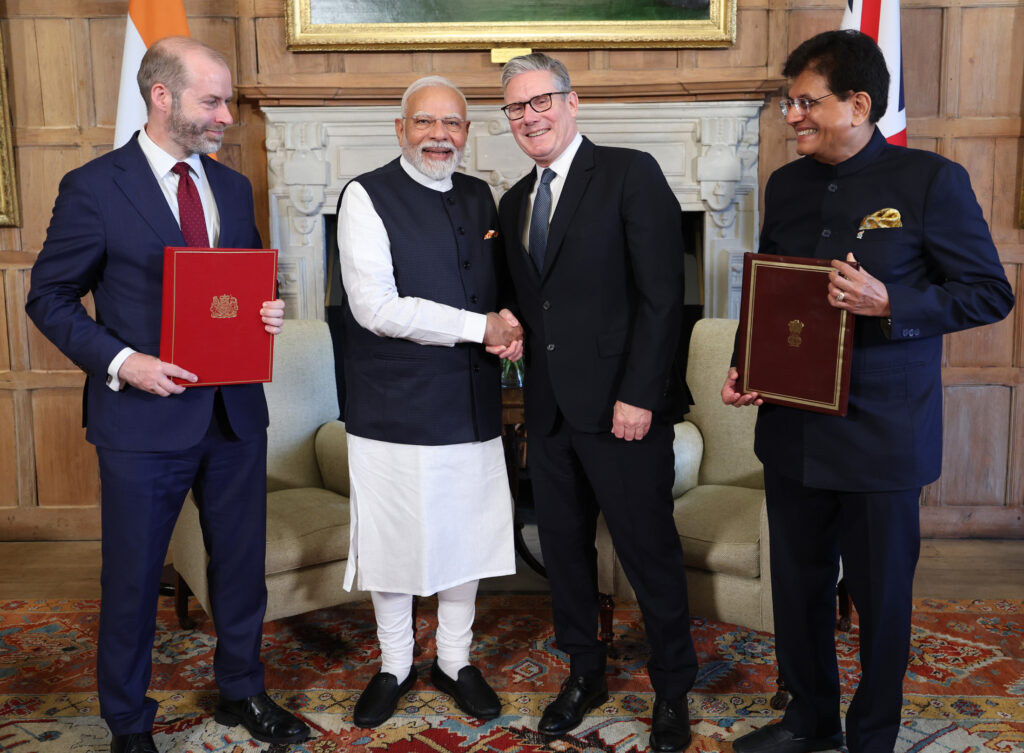(Forelines) – Under the visionary leadership of Indian Prime Minister Narendra Modi, India and the United Kingdom signed the Comprehensive Economic and Trade Agreement (CETA) Thursday, marking a significant step toward forging a closer economic connection, india’s Ministry of Commerce & Industry said in a statement.
In front of prime ministers of India and UK, the agreement was signed by Jonathan Reynolds, Secretary of State for Business and Trade, and Piyush Goyal, Minister of Commerce and Industry.
India-UK bilateral ties represent a historic milestone, according to Indian Prime Minister Narendra Modi in a joint press statement.
“I am pleased that, after years of dedicated efforts, the Comprehensive Economic and Trade Agreement between our two countries has been concluded today,” PM Modi said.
This free trade agreement marks a significant shift in India’s relations with the main industrialized economies and reflects a shared commitment to furthering economic integration.
India and the UK are the fourth and sixth largest economies in the world, respectively, so their bilateral relationship is important from an international economic standpoint.
The India-UK CETA was signed following the successful conclusion of negotiations was declared on May 6, 2025. The two nations aim to increase their bilateral commerce, which currently stands at around USD 56 billion, by 2030.
99% of India’s exports to the UK, encompassing almost the whole trade basket, now enjoy unprecedented duty-free access because to CETA. Alongside rapidly expanding businesses like engineering goods, car components, and organic chemicals, this is anticipated to create new opportunities for labor-intensive industries including textiles, marine products, leather, footwear, sports goods, toys, and gems and jewelry.
There would be numerous advantages for India’s services industry, which is a major engine of the country’s economy. Increased market access is offered by the agreement in the areas of digital trade, professional and educational services, financial and legal services, and IT and IT-enabled services. Talent’s capacity to work in the UK will be facilitated by streamlined visa procedures and expanded entry categories, which will allow Indian experts working for businesses to work in all UK service industries. These professionals such as architects, engineers, chefs, yoga instructors, and musicians.
Piyush Goyal, the Union Minister for Commerce and Industry, expressed his sincere gratitude to Prime Minister Narendra Modi for his visionary leadership and unwavering dedication, both of which have been crucial in reaching this historic accord. He said.
“This CETA marks a milestone in the trade relations between two major economies, setting an ambitious and balanced framework. It unlocks tariff-free access on 99% of Indian exports to the UK, covering nearly 100% of trade value- including labour-intensive sectors advancing the ‘Make in India’ initiative and setting the stage for bilateral trade to double by 2030,” India’s Ministry of Commerce & Industry said in a statement.
“It includes ambitious commitments in goods and services, covering various sectors, while enhancing mobility for Indian professionals by simplifying access for contractual service providers, business visitors, and independent professionals,” India’s Ministry of Commerce & Industry said.
“The innovative Double Contribution Convention will exempt Indian workers and their employers from UK social security contributions for three years, boosting competitiveness and earnings. This FTA will serve as a catalyst for inclusive growth, benefiting farmers, artisans, workers, MSMEs, startups, and innovators while safeguarding India’s core interests and accelerating our journey towards becoming a global economic powerhouse,” India’s Ministry of Commerce & Industry added.
India has further mediated a deal under the Double Contribution Convention. By exempting Indian professionals and their employers from social security payments in the UK for a maximum of three years, this would make Indian talent more cost competitive.
The objective of the agreement is to rise the inclusivity of commerce. Global value chains will become more accessible to women and youth entrepreneurs, farmers, fishermen, startups, and MSMEs with rules that promote innovation, support sustainable practices, and reduce non-tariff obstacles.
In the upcoming years, it is anticipated that CETA will greatly increase trade volumes, generating jobs, increasing exports, and fostering a stronger, more robust economic partnership between India and the UK.

